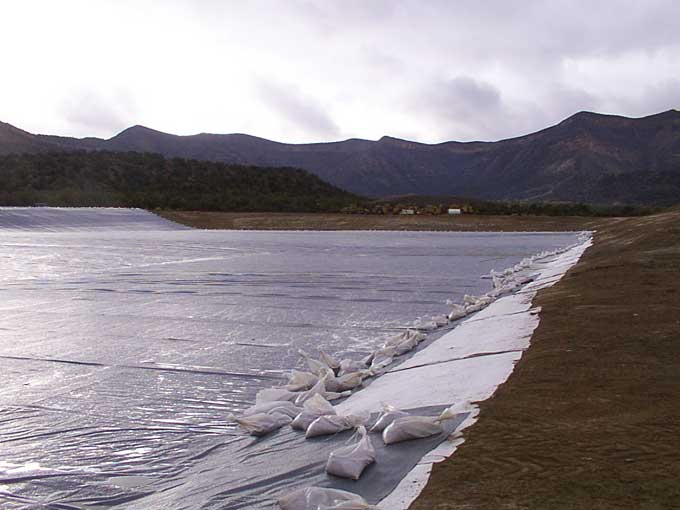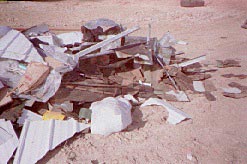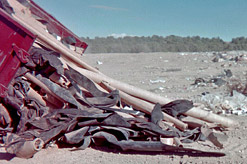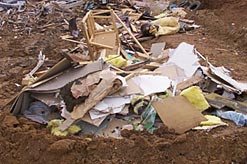
By definition and intent, all material that is disposed of at the county landfill is solid waste. However, some materials can be separated and handled differently. Such material as this would include construction/demolition debris, electronics (e.g. computers, cell phones, etc.), compostables, appliances, dead animals, tires, and petroleum-contaminated soils. For unusable items or for special waste consideration, individuals should contact the landfill office for more information or they may download “Special Wastes Request for Disposal/Characterization” two-page form to verify the material can be accepted by the landfill.
All appliances are placed in the metal and appliance area. Appliances that are freon or ammonia based require a certification statement, Freon Compliance Statement Form. Hot water heaters, stoves, washers, and dryers are placed directly into the metal pile. For more information about appliances, refer to Freon and Appliances.
All dead animals brought onto the site are placed into a separate disposal area for prompt burial. Individuals arriving on site will be directed to the end of the pavement and a member of the landfill staff will meet them to complete the offloading and burial of the dead animal(s). Individuals no longer have direct access to the disposal location.
Batteries – Lead Acid
Lead acid batteries (car batteries, tractor batteries, truck batteries, lawn mower batteries, etc.) cannot be disposed of at the landfill. Batteries that are found are placed to the side and sent to Belt’s Salvage for recycling. Some stores have an exchange program where if you buy a new battery, they will accept an old one in for their handling. At times credit is given for the return of old batteries, often times referred to as a “core charge”.
Batteries – Rechargeable
Rechargeable batteries (cell phones, toys, cordless phones, cordless tools, etc.) should not be disposed of in the landfill. The landfill has a contract with the Rechargeable Battery Recycling Corporation (RBRC) to accept small rechargeable batteries (up to one pound). Full boxes are sent to RBRC for recycling at no charge to customers. If you have an APC power backup for your computers, the company will work with customers who wish to recycle their batteries in exchange for obtaining a new battery. Go to www.apc.com for more information on their recycling program.
This is the organic and vegetative (plant) material that can easily decompose making a soil-like product or soil amendment. Because composting can be done with a low input of resources, the county landfill has a small composting operation. Grass clippings, leaves, and garden waste are placed in the compost pile directly. Tree limbs, branches, and similar cuttings are placed in a branch pile which is chipped by a contractor, and then placed into the compost pile or in landfill areas. No bags (plastic or paper), no wire, no trellis (metal or wood), no landscape timbers, no household trash, or anything that is not vegetative is to be placed there (See Construction & Demolition Debris below).
This material is from construction or deconstruction projects such as wood or asphalt shingles, treated wood, wood paneling, insulation, dirt, concrete, drywall, siding, and similar material. A discount is available Monday through Friday for clean C&D (no household, paper, plastic bags, or food waste – see Compost above). Signs are posted with a more detailed list of acceptable and unacceptable material! Here are a few examples of contaminated Construction & Demolition materials:

Although the material in this load is shingles and metal tin, there is also plastic wrap (also referred to as film or "kite" because it is easily windblown). If the plastic and paper had been separated, it would have been considered a clean load.

The liner material is accepted into the CD pit.

The wood and sheetrock are acceptable for a construction disposal area, however, the plastic and other paper products are considered contaminated. This load was not acceptable for the construction area and had to be cleaned up. If the contaminants had been put to the side and taken to the landfill or the baling facility, this would have been acceptable.
The county landfill is able to receive, treat, and utilize petroleum and other non-hazardous contaminated soils on site. Effective 1 October 2005, the landfill determines the acceptability of such material. Any individual or company that has a need to dispose of Petroleum Contaminated Soil (PCS) no longer needs to obtain approval from the Grand Junction Colorado Department of Public Health and Environment Office.
The big news in the solid waste field is the disposal of old computers, monitors, copier electronic accessories, and TVs or e-waste. Colorado has banned these items from all landfills and transfer stations in the state. In 2002, the Colorado Office of Energy Management helped fund a special turn-in event for Southwest Colorado including Montezuma & Dolores Counties. The second turn-in event was held in February 2004. The landfill now allows e-cycle during regular business hours to provide an outlet for all our community members — businesses, institutions, and residents – to properly recycle and dispose of their obsolete e-waste. Natural Evolution of Tulsa, Oklahoma is the vendor that the county uses and they are certified under ISO 14001, R2, and E-Steward standards.
Paints are considered a liquid waste and cannot be accepted at the landfill. Old paint can be painted onto scrap wood or cardboard. When dried, the painted material and empty paint cans/containers can be placed into the trash for normal disposal. Cans with old latex paint can be opened and the paint will dry to a gel like state (provided no water has gotten into the can). The gel in the cans can be thrown into the trash for disposal at the landfill as normal trash.
Used oil is considered a liquid waste and cannot be accepted at the landfill. One alternative is to take the used oil to a local oil change store or a store that sells motor oil for their recycling efforts. Another alternative for very small quantities of oil, is to put cat litter or sawdust on the spilled oil until it is absorbed. Then place the litter in the trash for disposal at the landfill. This option is intended for households only.
If you have a question, call your hauler or the landfill. We will try to get you an answer.
Effective September 1, 2013
Mel Jarmon, Landfill Manager
26100 County Road F
Cortez, CO 81321-8104
Phone: (970) 565-9858
FAX: (970) 565-9309
Hours of Operation: Monday — Saturday, 8 am to 4 pm